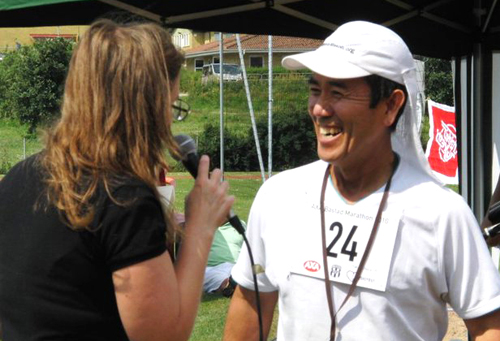By Charles Lam
Northwest Asian Weekly

Hajime Nishi at a marathon in Sweden. (Photo from Hajime Nishi)
Hajime Nishi has run approximately 16,690 miles, two-thirds of the Earth’s circumference.
This week alone, he will run 78.6 miles in three marathons across the United States, breaking his normal pace of two marathons a week. It’s not his body holding him back, it’s scheduling — almost no one hosts marathons on weekdays.
“Normally, I only run two marathons a week because they’re on Saturdays or Sundays,” Hajime said. “But this week, there was one on Monday, so I could run three.”
His ultimate goal? He wants to run 1,000 marathons in 250 countries by 2049, the year he turns 100 years old.
Conventional thinking would dictate that running that much distance would take an intense amount of training and conditioning — that Hajime has drilled marathon running down to a science. But conventional thinking would be wrong.
Hajime doesn’t run for time. Rather, he is what he calls an “ecomarathoner,” someone who runs marathons not to compete, but to relax and to convene with nature. His finish times range from a respectable three hours and forty-five minutes to over ten hours. In 2011, the average marathon finish time was four hours and twenty-eight minutes. Though now It’s not uncommon to see Hajime finishing last, this wasn’t always the case.
“My first marathon was the Honolulu Marathon in 1990,” Hajime said. “I was 41 years old and I had read about it somewhere. I heard it was almost like a festival. I didn’t think much about it until a week before, when I decided to go.”
The marathon was a new experience for Hajime, physically and emotionally.
“I had never run that far before. I trained once in a gym near Tokyo during the week and I could only run 5k, not even 10k,” he said. “But I went and I was able to run the first half and power walk the second half. The very end I ran because it was downhill. I checked the next day and there were 3,000 people behind me. I thought, ‘Wow, everyone can do this.’”
Friday will be his second Seattle Marathon. He ran his first in 1996 and, though he normally doesn’t run the same marathon twice, he made an exception.
“I heard that they actually changed the route, so I wanted to run it again,” he said.
Despite his return, his favorite marathon remains the one he did in 1995 on the island of Tahiti.
“We started the marathon really early, around 4 a.m.,” Hajime said. “It was dark. They put all the water stations in the local villages and the young people were there around campfires, playing guitar and dancing. The atmosphere was so amazing, I would get to one water station, dance with the people there, and when I got tired, I would run to the next one.”
That is the core of an ecomarathon runner — getting to know the place, the people, and yourself.
“Running marathons gives me a lot of opportunity to think about myself,” Hajime said.
“Because I am free from running for time, I have a wonderful time every time. The blood circulation just brightens my mood. It frees me from whatever family issues, personal issues, or work stress I have. That’s the great benefit of slow running.” (end)
Charles Lam can be reached at charles@nwasianweekly.com.



